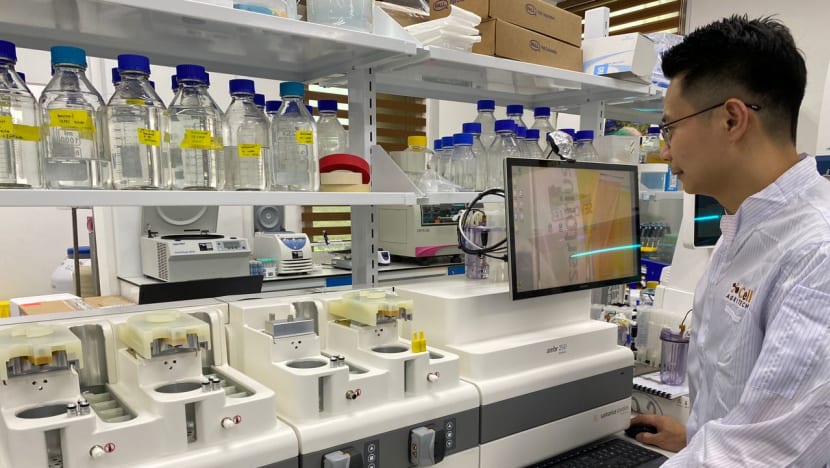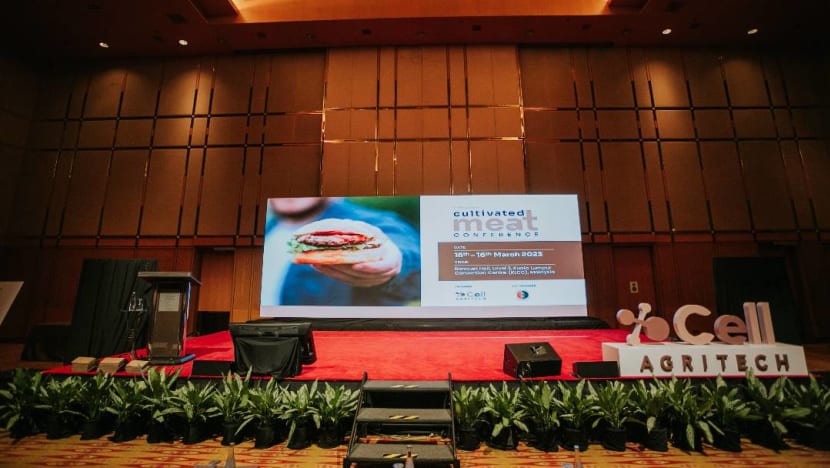Malaysia is launching its first lab-grown meat facility. Could it help reduce agricultural emissions?
To mark Earth Day, CNA looks at efforts to set up Malaysia’s first cultivated meat production facility in Penang and what it means in the fight against climate change.

A taco wrapped around a mixture of cultivated and plant-based fish meat. (Photo: Cell AgriTech/Umami Meats)
SINGAPORE: Malaysia is poised to start producing its own lab-grown meat in the next two years, a move that could potentially help in the urgent fight against climate change.
Malaysian company Cell AgriTech aims to finish building the country’s first cultivated meat production facility in Penang by the end of 2024, where it will grow live animal cells in bioreactors into meat products for consumers.
On the surface, this technology is greener than traditional farming. Growing meat in a lab requires far less land and can be done closer to consumers, reducing the carbon footprint from land clearing and logistics needed to deliver the product.
According to a 2013 report by the United Nations’ Food and Agriculture Organization (FAO), 14.5 per cent of all human-caused greenhouse gas emissions can be attributed to livestock farming.
Majority of these emissions come from feed production and gas released during animal digestion, for instance, when cows burp and expel methane. Methane is reported to be more harmful to the environment than carbon dioxide.
“We use less land, less water and produce less waste,” Cell AgriTech founder Jason Ng told CNA, noting that cells would only need to be extracted from a single animal.
“If you talk about fish, some people don’t eat the head or the skin. But we can just take muscle cells from a fish and produce fish fillet.”
Cell AgriTech, partnering with Singapore-based cultivated seafood producer Umami Meats, is aiming to produce cultivated grouper and Japanese eel meat at scale for export by 2025.
Malaysia currently does not allow the sale of cultivated meat, but Mr Ng said his company is working with the health ministry to regulate his products for safety.
It is a stringent certification process that Mr Ng believes will make his cultivated meat even safer for consumption than conventional meat, especially as his products - unlike livestock - would not have been injected with antibiotics.
The company will first focus on cultivating seafood before moving on to beef and chicken. The high cost of cultivating meat products makes premium fish ideal candidates to be lab-grown as they are able to fetch higher prices when sold.

Mr Ng hopes to reduce the price of his lab-grown seafood from US$60/kg to less than US$30/kg before 2025, by using a cheaper nutrient-rich medium that allows cells to grow. The target is to eventually price all his products at US$10/kg.
“Last year, we unlocked the alternative to an ingredient that made cultivated meat very expensive,” he said, adding that this was a crucial step towards large-scale production that paved the way for the setting up of the facility.
For all the talk that producing lab-grown meat is more environmentally friendly as compared to traditional farming methods, Mr Ng acknowledged that a significant amount of electricity is needed to grow meat in bioreactors at scale.
“We have good sunlight in Malaysia, so we will use solar energy to power our bioreactors. We cannot say that we are using zero electricity from conventional sources, but we will try to minimise it,” he said.
ROADBLOCKS AHEAD
Dr Tan Thuan Chew, an expert in alternative proteins at Universiti Sains Malaysia, said the process of cultivating meat is “not entirely without environmental impact”.
“The production of cultivated meat generates waste materials such as growth media, bioreactors and other equipment,” he told CNA. “Disposing of these materials can have an environmental impact if not managed properly.”
Growth media refers to the solution that allows cells to grow and proliferate. This includes fetal bovine serum, which is the liquid fraction that remains after blood drawn from a bovine fetus coagulates.
Nevertheless, Dr Tan noted that cultivated meat has the potential to “significantly reduce” greenhouse gas emissions from traditional meat production, and address issues like animal welfare and food security.
“However, it is still an emerging technology and more research and development are needed to make it commercially viable and sustainable,” he said.
For instance, Dr Tan said Malaysia might need to invest in new infrastructure to support the production and distribution of cultivated meat, including specialised facilities for growing meat cells.
“In addition, cultivated meat is currently produced on a small scale, and scaling up production to meet consumer demand could be challenging,” he said.
“The technology used to create cultivated meat may need to be refined to improve efficiency and reduce costs.”

To this end, Cell AgriTech is working with Umami Meats – the latter supplies the technology including the fish cell lines, optimised growth media formulation and production process know-how.
Cell AgriTech, as a company based in Malaysia, will provide large-scale manufacturing know-how along with lower labour and production costs.
Beyond infrastructure, Dr Tan said consumers might have concerns about the safety, taste or texture of cultivated meat, highlighting that authorities should help raise awareness of its potential benefits.
There is also the issue of whether these lab-grown meat will be halal-certified, he noted.
“Whether cultivated meat is halal or not has been debated among Islamic scholars and experts,” said Dr Tan.
On his end, Mr Ng said Cell AgriTech has invited the halal certification authority in Malaysia to lead the discussion as part of a working committee with academia.
“We informed JAKIM (Department of Islamic Development Malaysia) that we can start with halal cultivated seafood,” he said.
“They need some standards, starting from how we take the cells from the animal. If they have some standards, we believe that halal certification can be possible.”
CNA has reached out to JAKIM for comment.
As for the taste and texture of cultivated meat, Mr Ng said the fact that it is grown from animal cells means there will be no difference. Even the cholesterol level is similar.
“A lot of meat lovers, you can’t make them go to plant-based meat (because of perceived differences in taste). That's why we created this alternative, because it’s actually real meat,” he said.
Mr Ng also claimed that his cultivated meat is more nutritious than conventional meat, as the cells are meticulously fed and nurtured.
This advantage, he believes, would outweigh any potential environmental benefits when making his product appeal to the Malaysian public.
“To be honest, the Europeans feel more strongly about all these environmental concerns,” he said.
“But Malaysia has also committed to net carbon emissions agreements, so (I feel cultivated meat) will fall under the government’s agenda.”
REDUCING CLIMATE IMPACT
Dr Tan said Malaysian authorities can develop policies and regulations to promote sustainable livestock farming practices and reduce greenhouse gas emissions from the meat industry.
This includes using existing policies such as the National Agro-Food Policy 2021-2030 and the National Policy on Climate Change, and overseas frameworks like Singapore’s policy on cultivated meat, he said.
In 2020, Singapore was the first country to approve cultivated meat products for sale. The US declared lab-grown meat safe to eat two years later.
“Consumers can be educated about the environmental impact of meat production and encouraged to reduce their meat consumption or switch to more sustainable alternatives,” Dr Tan added.

This comes as global meat consumption has increased significantly in recent decades, with per capita consumption almost doubling since the early 1960s, according to the FAO.
A 2009 study calculated that Malaysia’s meat consumption was expected to increase through to 2020, with a corresponding increase in meat production and hence greenhouse gas emissions.
The study was authored by Tey Yeong-Sheng, a senior researcher from the Institute of Agricultural and Food Policy Studies at Universiti Putra Malaysia.
Poultry production in Malaysia was projected to cause 3.2 billion metric tons of carbon dioxide emissions in 2020, up from 1.7 billion metric tons in 2010, the study said. Production of poultry was found to have the most environmental impact, ahead of beef, pork and mutton.
Dr Tan also called for an improvement in living standards in Malaysia, highlighting that this can indirectly help reduce greenhouse gas emissions from meat production and consumption.
“People living in poverty often have limited access to healthy and sustainable food options, which can lead to an overreliance on cheap and unhealthy meat products,” he said.
Editor's note: This article has been updated following clarifications by Umami Meats.
Read this story in Bahasa Melayu here.

















